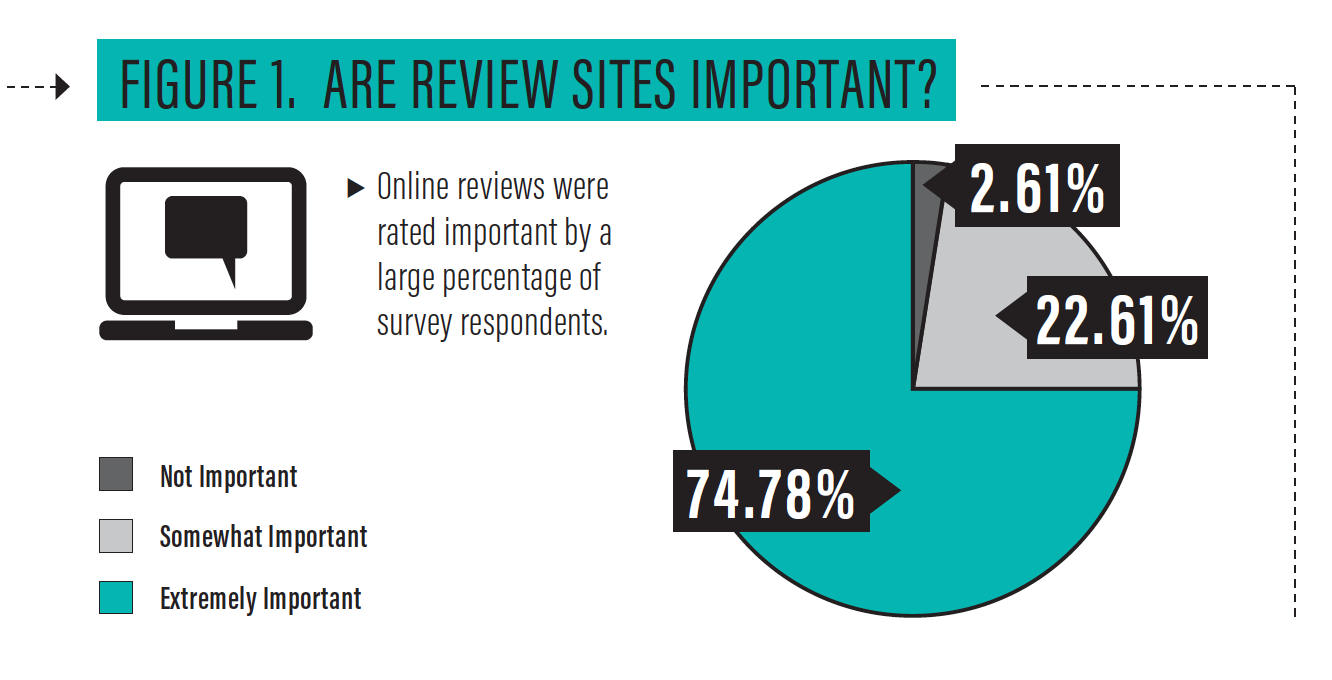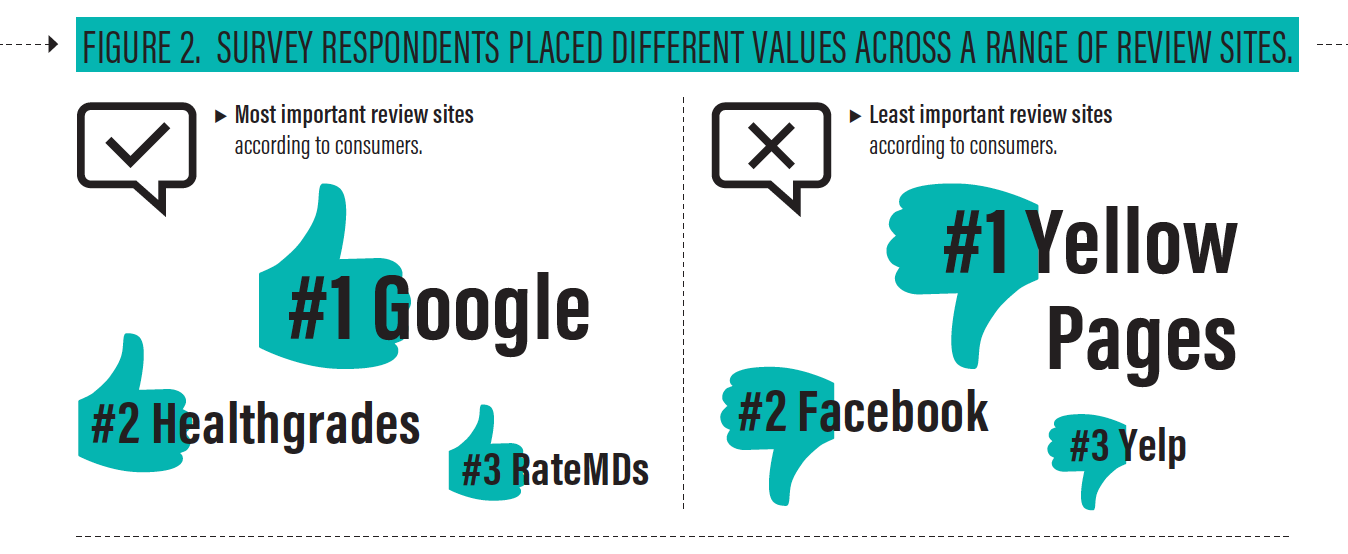
In the world of today, eye care practices and eye surgeons ignore online reviews at their peril. However, according to the search engine optimization firm BrightLocal, health care is the third highest category behind only restaurants and hotels for consumers to use reviews when making choices. Further, data from the Better Business Bureau show that 80% of US consumers now use reviews when researching a purchase.1 It is safe to say that the trend is similar in other parts of the world.
what is a reviews strategy?
In a nutshell, a comprehensive reviews strategy must include (1) an easy and automated way to solicit reviews across the specific sites important to consumers of elective eye surgery, (2) an automated method to publish reviews on the practice’s website and social media, and (3) a reporting mechanism to keep the surgeons and staff up to date on both the positive and negative consumer online comments.
Obviously, online reviews matter a lot. However, implementing an effective reviews strategy is harder for health care providers—particularly premium elective health care specialists such as cataract and refractive surgeons—than it is for ordinary businesses.
For most businesses, consumers can post reviews on a few major review sites such as Google, Yelp, and Yellow Pages and maybe one or two other sites specific to their businesses such as TripAdvisor for hotels and Zomato for restaurants.
By contrast, there are myriad health care–specific sites, including Healthgrades, RateMDs, Vitals, UCompareHealthcare, and Zocdoc. To complicate matters further, major review sites such as Google and Yelp display consumer reviews for both individual surgeons and practices, including all practice locations. A cataract and refractive surgery practice with eight doctors could have as many as 18 review profiles to be managed on Google and Yelp alone, and that is for only one location. For each additional location, multiply by the number of locations. Ouch!
Given this confusing scenario, how should a practice’s reviews strategy be tailored to be effective and efficient? Which sites are best to send patients to for reviews? Many reviews companies (especially reviews-only companies) have formed partnerships with sites such as Facebook or Healthgrades and, therefore, offer narrow strategies that generate patient reviews only on the sites they are partnered with.
CONSUMER SURVEY
Where can a cataract or refractive surgeon turn to obtain objective information? Recently released survey data can provide some answers.
A survey about consumers’ use and valuation of online reviews was recently conducted on the educational eye surgery website Better Vision Guide (www.bettervisionguide.com; Ceatus Media Group). Consumers were asked seven questions related to their uses of the internet and of reviews when researching eye surgeons and elective eye surgery procedures. The survey received more than 250 responses over a period of 30 days.

Data from the survey (Figure 1) show that nearly 75% of respondents reported finding reviews to be an extremely important way to gather information about prospective eye surgeons, 22.61% said reviews are somewhat important, and only 2.61% said that reviews are not important.
WHICH SITES?
The most surprising results came from questions related to which review sites are perceived by consumers to be the most valuable, specifically when researching LASIK and cataract surgeons.
Because each consumer may value review sites differently, one purpose of the survey was to determine whether review sites that are held in high regard by some consumers are held in low regard by others. This type of data is important because it provides insight into how eye surgeons should approach a reviews strategy. Can they limit their reviews strategy to only a few sites, or do they need to focus on a variety of review sites in order to capture the attention of a wide range of consumers?
The conclusion of the survey was that consumers place vastly different values across a variety of review sites (Figure 2).

The two questions asked were these:
- Which review sites are most important when researching a LASIK or cataract surgeon?
- Which review sites are least important when researching a LASIK or cataract surgeon?
Not surprisingly, Google received the highest number of votes as the most important review site. Healthgrades and RateMDs ranked Nos. 2 and 3, respectively; Yelp ranked No. 4. The sites rated least important by the most respondents were, No. 1, Yellow Pages; No. 2, Facebook; and No. 3, Yelp.
These data are interesting for a couple of reasons. First, many reviews companies promote Facebook as an important site to solicit for patient reviews, but it was not favored by a significant number of survey respondents. Second, Facebook was followed by Yelp, which as I noted earlier was cited as most helpful by a significant number of respondents. Third, the health care–specific review sites scored well in votes for most important, and few respondents voted for these sites as least important.
These data suggest that consumers place a high value on reviews when researching cataract and refractive surgeons. The data also suggest that different consumers can, and do, place vastly different values on different sites. This may mean that a reviews strategy that focuses only on soliciting reviews for a few sites, such as Google, Yelp, and Facebook, as some marketing and reviews companies suggest, is not a good strategy. To be sure, this strategy might attract prospective patients who gave Google votes as the most important review site and Yelp as fourth most important. However, it would have no benefit for the other consumers who voted Facebook and Yelp as among the least important review sites. Further, this strategy would ignore the significant value of the health care–specific sites, which were voted by consumers as important sites.
THE BOTTOM LINE
Clearly, the reviews strategies of cataract and refractive surgeons should target a wide range of review sites, not just two or three. Further, the review sites to focus on should include the popular general sites as well as the health care–specific sites.
1. Better Business Bureau website. Get More Customers With Consumer Reviews. https://www.bbb.org/west-florida/news-events/business-tips/2016/07/get-more-customers-with-consumer-reviews/). Accessed December 4, 2017.




